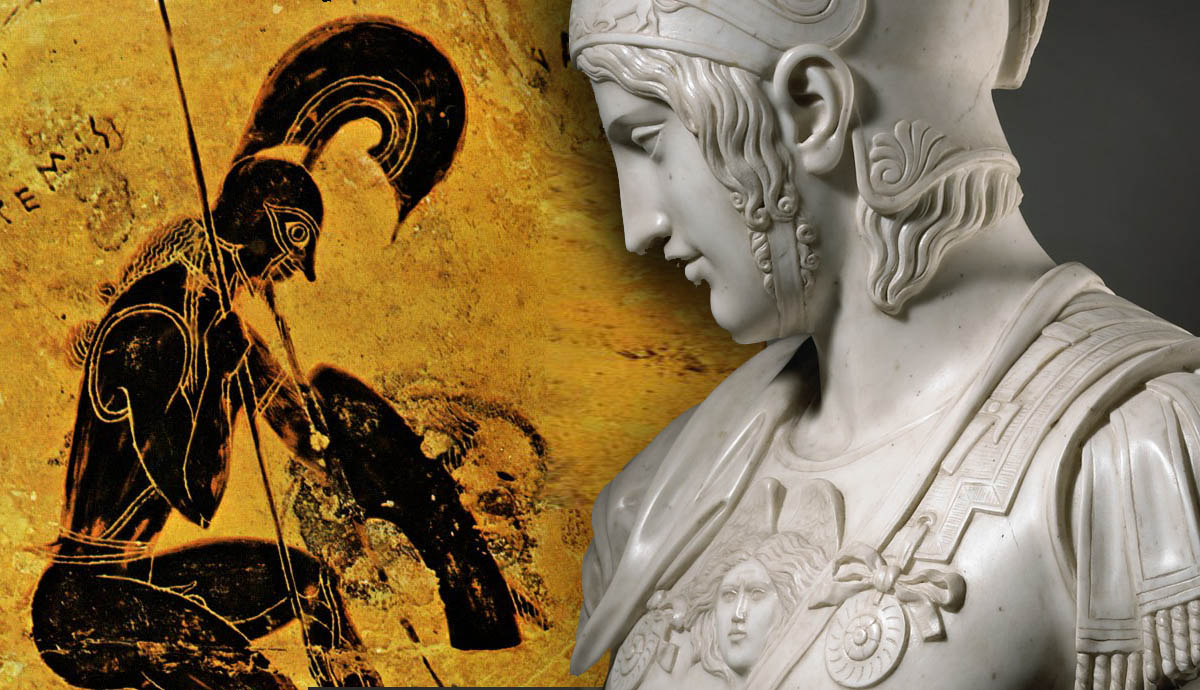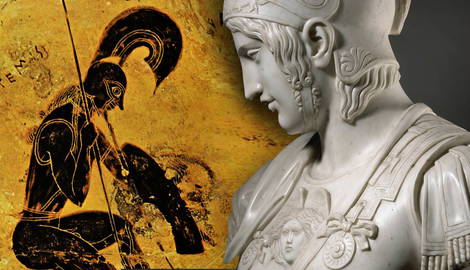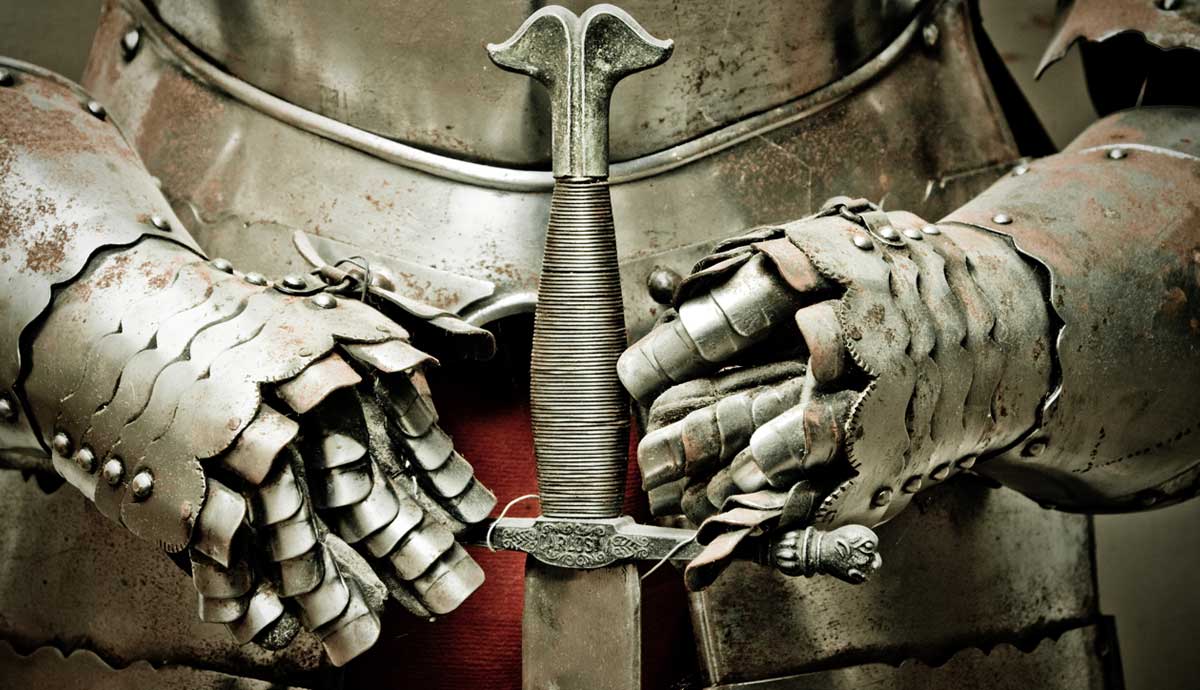
Ares, Greek god of war, was a true wild child who personified the spirit of bloody battle and vicious warfare. A son of Zeus and Hera, Ares was reckless, bloodthirsty, and brutal, representing all the worst and most terrifying aspects of battle. He was said to have been nursed by Thero (savagery) and accompanied by Demos (terror) and Phobos (fear). Understandably, this made him pretty unpopular, and even Zeus, Ares’s father, would have banished him to the pits of Tartarus if he weren’t his own flesh and blood. Among his many derogatory nicknames, there were “War Glutton,” “City Sacker,” “Shield Piercer,” and even “Curse of Men.” Read on to learn more about the enfant terrible of ancient Greece.
1. Ares Is One of the Olympian Gods

Ares is best known as the god of war in Greek mythology. He was the first child of Zeus and Hera and had a further three full siblings (depending on the myth): Eileithyia (childbirth), Hebe (youth), and Hephaestus (the smith god). Athena, the goddess of war, was his half-sister. Unfortunately, because he was such a handful, neither of his parents nor his family particularly liked him. The ancient Greek god even caused conflict between his own parents. Zeus accused Hera of mollycoddling Ares and blamed her for causing his terrible behavior. In the Iliad, Zeus says to Ares, “Hera’s urgings, I trust, have made you insufferable.”
2. His Stories All End Badly

As if to add insult to injury, in all his Greek myths, Ares suffered a series of humiliations and defeats, even at the hands of his own family. One of the worst was during the Trojan War. Typically, Ares was up to no good, and he chose to side with the Trojans instead of the Greeks. This meant he was fighting against his friends, parents, and sisters. He almost helped the Trojans win the war, but he was stopped by his half-sister Athena, who struck him on the back with a sharp rock, causing grievous harm.
In another myth, Ares was chained and imprisoned in a bronze urn by two giants for thirteen months, a lunar year. That would have been the end of Ares and his bloody influence, except that the stepmother of the giants told Hermes what they had done, and he freed Ares.
The reason Ares was never the hero in his myths was to send moralizing messages to the ancient Greeks that mindless violence and aggression are signs of weakness and failure. Instead, Athena’s calculating, intelligent approach to warfare was encouraged.
3. He Was Almost Rejected by Zeus

According to the Iliad, Zeus had little time for Ares and his troublesome ways. During the Trojan War, when Diomedes wounded Ares with his spear, Ares went straight to his father to complain. In response, Zeus said, “Do not sit beside me and whine, you doubled-faced liar. To me you are the most hateful of all gods who hold Mount Olympus.” But Zeus stops there, remembering Ares is still his own son, eventually adding, “You are my child… But were you born of some other god…long since you would have been dropped beneath the gods of the bright sky.”
4. He Never Married

Given that Ares was such hard work, perhaps it is no surprise that he never married. But he still had several love affairs and fathered many children. Ares famously had a love affair with Aphrodite, the Greek goddess of love. Aphrodite was still married to Hephaestus at the time, so they were doomed from the start. When Hephaestus caught them in an intimate embrace, he trapped them in an invisible net and invited all the gods of Mount Olympus to come and gawp at them to cause maximum humiliation and embarrassment. Ares also had love affairs with Eos, the goddess of dawn, and Enyo, the goddess of war and strife. His children include Phobos, Deimos, and the twins Romulus and Remus in classical mythology.
5. The Greek God of War Received Little Worship

Cult worship of Ares seems to have been extremely limited in ancient Greece. There are passing references to an altar of Ares at Olympia and a temple at Athens. There is evidence of an archaic Spartan statue of Ares showing the god in chains. This suggests that they were trying to keep him prisoner in the city, and chained statues were fairly common. The Spartans made sacrifices to Athena before embarking on war and sacrifices to Ares upon their return. He received an ox for a victory by military strategy or a rooster for victory through onslaught. The Greeks believed that the Scythians made human sacrifices to Ares, sacrificing 100 prisoners of war to their equivalent of the god.
6. Ares Played an Important Role in the Founding of Thebes

The Greek god Ares presumably also received cult at Thebes, as he was an important player in their founding story in Greek mythology. Ares was the father of the water dragon killed by Cadmus, the legendary founder of the Thebes. The dragon’s teeth were sewn into the ground as if they were a crop and grew into fully armed warriors. To propitiate Ares for his action, Cadmus served the god for eight years and also married his daughter by Aphrodite, Harmonia. This won Thebes the favor of the god and it went on to dominate the surrounding region of Boeotia. The plains of Boeotia were sometimes called the “dance floor or Ares.”
7. Ares Became the Roman God Mars

In Roman religion, Ares became syncretized with Mars, the Roman god of war. Mars was, however, quite a different man from the hot-headed and irritable Ares of Greek religion. Ares’ Roman counterpart was a highly respected war god known for taking a more measured and level-headed approach to warfare.
The Roman people saw Mars as a vital character in their mythology, second only to Jupiter, the king of all gods (formerly Zeus). In fact, Romans saw Mars as the ancestor of Rome’s founders. In the mythical prehistory of Rome, Mars impregnated Rhea Silva, the mortal mother of Romulus and Remus. Mars’ consort was Nerio (Valor), who was often identified with Minerva, the Roman version of Athena. It was mostly later poets, inspired by Greek tradition, that connected Mars with Venus, the Roman version of Aphrodite.

In Rome, March (Martius) was named for the god Mars as it was the start of the campaign season. Early in Rome’s history, an altar for Mars was dedicated in the Campus Martius, also named for the god. The emperor Augustus dedicated a temple to Mars Ultor in Rome to celebrate his military victories and how they allowed him to restore peace to the Roman world as its supreme leader.
The popularity of Mars among the Romans is further testified by the number of dedications made to the god wherever the Roman army traveled in the ancient world, even as far as Great Britain. This stands in stark contrast to the ambiguous Greek Ares.










